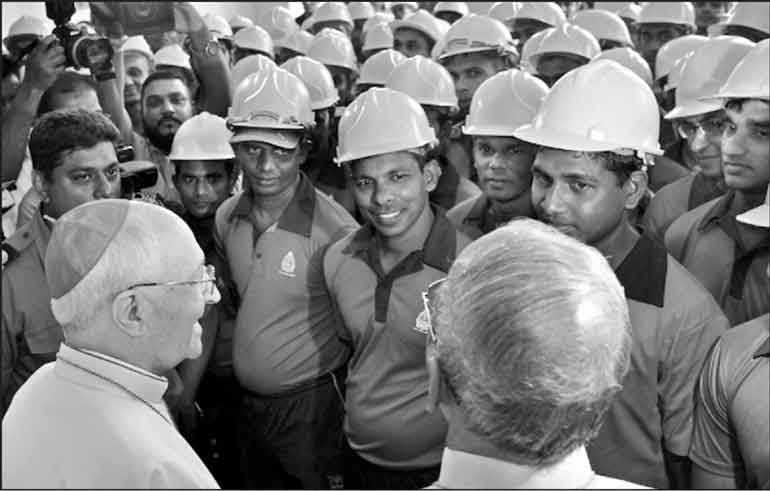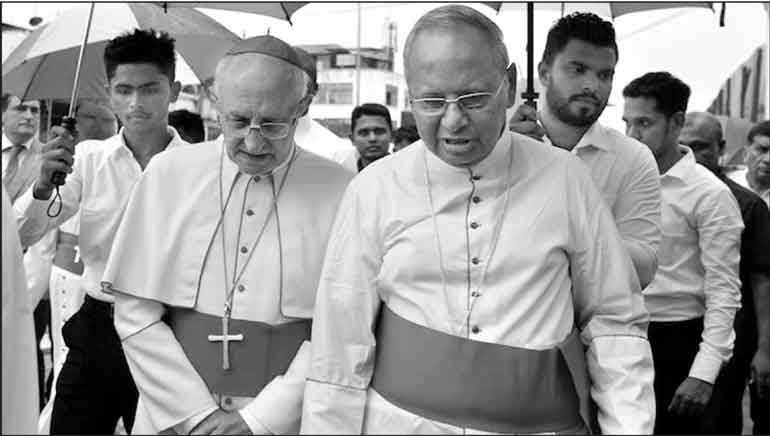Friday Feb 20, 2026
Friday Feb 20, 2026
Saturday, 25 May 2019 00:00 - - {{hitsCtrl.values.hits}}

Cardinal Fernando Filoni (left) and Malcolm Cardinal Ranjith speak to Navy personnel at St. Anthony’s national shrine in Kochchikade, Colombo, on 22 May. The Government has donated land from Colombo’s port area to the Church to allow them to build an extension to facilitate a new soup kitchen, museum and car park, in the wake of the Easter suicide bombings that struck three churches and three luxury hotels in the island nation – ucanews.com

Cardinal Fernando Filoni (left) walks with Head of Colombo Archdiocese Malcolm Cardinal Ranjith during their tour of the bombed churches – ucanews.com
UCAN: One of the Vatican’s top officials has made an unheralded visit to Sri Lanka to show solidarity with Catholics still reeling from the Easter suicide bombings that claimed over 250 lives and injured more than 400.
Cardinal Fernando Filoni, prefect of the Vatican Congregation for the Evangelisation of Peoples, said during his three-day trip on 22 May that it was time to focus on rebuilding the nation.
The Cardinal condemned the 21 April bombings on a handful of luxury hotels and churches in the capital Colombo and Negombo by local extremists affiliated with the Islamic State (IS) group as an attack on the nation as a whole, rather than being directed at Christians alone.
“What happened on Easter Sunday was not only an act against a few people or a religion, it was an act against the people of Sri Lanka,” he said.
The prelate flew to Colombo after a trip to Thailand to celebrate the 350th anniversary of the Church’s mission to Siam, during which he highlighted the challenges evangelisation efforts face across Asia.
While paying a call on the national shrine of St. Anthony at Kochchikade in Colombo, he spoke to some of the bereaved family members from the Easter attacks.
“I am here first of all to bring you all closer to Pope Francis,” he said at the holy venue where the first of the coordinated blasts took place. It is now being reconstructed with the assistance of the Navy.
The papal representative’s itinerary included stops at all three major cities targeted by the terrorists, including Batticaloa on the eastern side of the island nation, and meetings with various priests and civil and religious personalities. At St. Sebastian Church in Negombo, which suffered the heaviest casualties, he was due to take part in a ground-breaking ceremony for a new cemetery chapel.
The Cardinal also joined a foundation stone laying event for a museum where relics of St. Anthony will be placed. The building will include a soup kitchen that will provide free meals to nearly 200 people of all faiths on a daily basis.
The Sri Lanka Ports Authority, the government institution that runs the harbour, donated the land. The Navy will handle its construction.
Cardinal Filoni said it is time for people of all faiths to work together to make Sri Lanka stronger and more united.
He told a group of workers from the Navy that, “your hands are building a mission where people praise God” and described the new church they were building as “a house of hope for all religions”.
Referring to St. Anthony’s shrine, Cardinal Filoni said, “[It] was not only a shrine for Catholics, but for Buddhists, Hindus, Muslims, and Christians. It is like a house for this big family of Sri Lanka.”
“And we wish that this will remain in the future a home for all. A house without doors, without windows open. It is open to everybody who would like to come here to find the open arms of Jesus, or the blessing of St. Anthony, and a moment of peace for their soul, their mind, their problems, their defeats,” he said.
The Cardinal said the shrine in the heart of the capital would forever be seen as a house of martyrs.
“We believe that those who passed away are martyrs of their faith.”
One month after the attacks, Sri Lanka is still suffering from the aftermath.
Communal clashes left one man dead on 13 May after riots led by predominantly Sinhala groups broke out in north-western Kurunegala district. Many Muslim-run shops and factories also came under attack.
Local religious leaders played a leading role in calling for the restoration of calm, and most people had started returning to work and to school by the middle of May.
Malcolm Cardinal Ranjith joined Cardinal Filoni during his trip, as did Bishop Anton Jayakody, Bishop Maxwell Frenville Silva, auxiliary bishops, priests, and Government Ministers.
Cardinal Filoni, an expert in Chinese affairs and the Middle East, served as the Apostolic Nuncio of Sri Lanka from 1981 until 1983.